Analysis of Personal and Professional Development for ALDI UK
VerifiedAdded on 2020/06/06
|16
|3709
|52
Report
AI Summary
This report delves into the realm of personal and professional development within the context of ALDI, a leading grocery chain in the UK. It explores various facets, including approaches to self-managed learning, the encouragement of learning in personal and professional settings, and the benefits of self-managed learning for both individuals and the organization. The report analyzes work-based problems faced by ALDI, such as collaborative working challenges, and proposes solutions. It examines different learning styles and time management strategies to enhance efficiency and productivity. Furthermore, the report includes an evaluation of the author's current skills and competencies, identifies development needs, and outlines a personal and professional development plan, incorporating implementation processes and an updated plan based on feedback and evaluation. The report provides a comprehensive overview of personal and professional growth strategies applicable within a corporate environment.
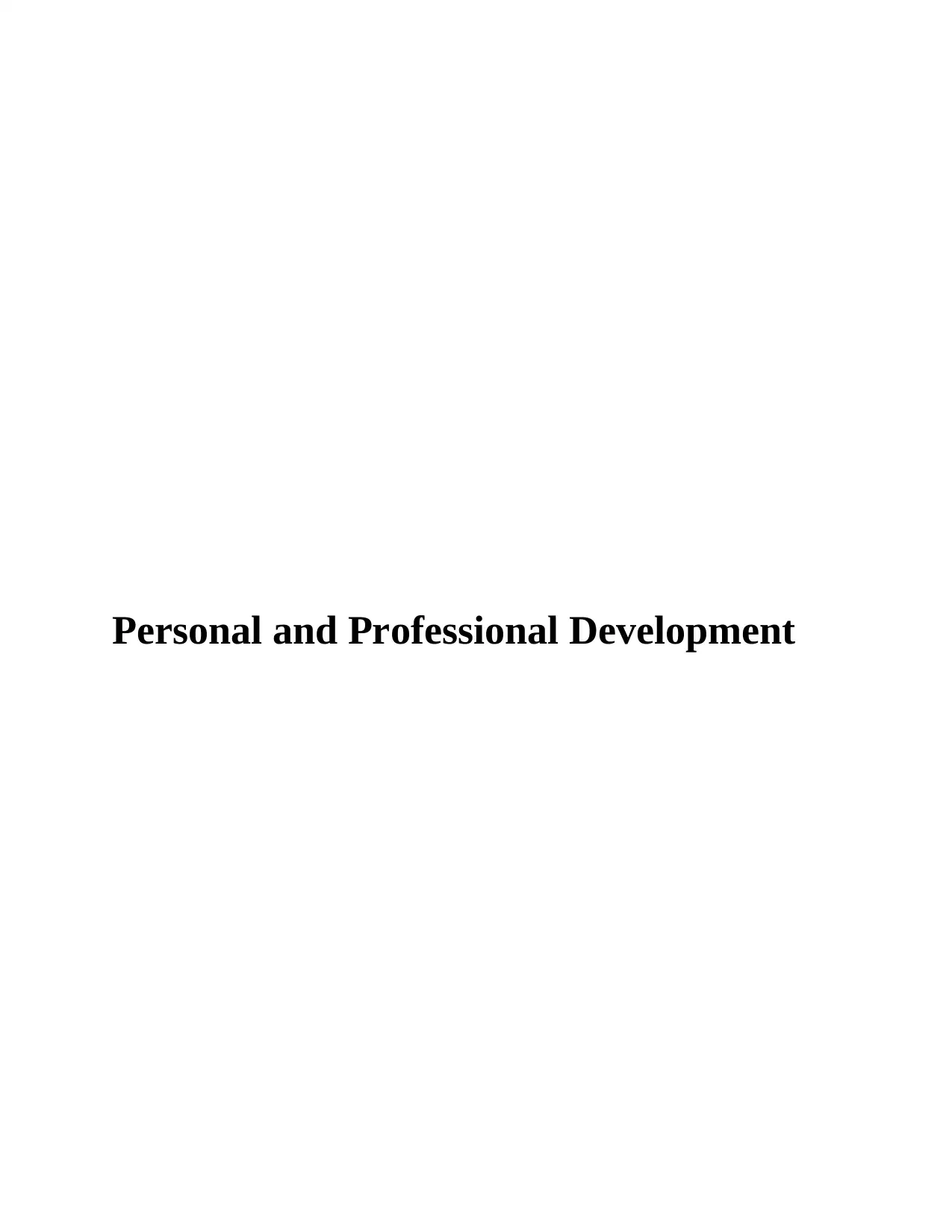
Personal and Professional Development
Paraphrase This Document
Need a fresh take? Get an instant paraphrase of this document with our AI Paraphraser
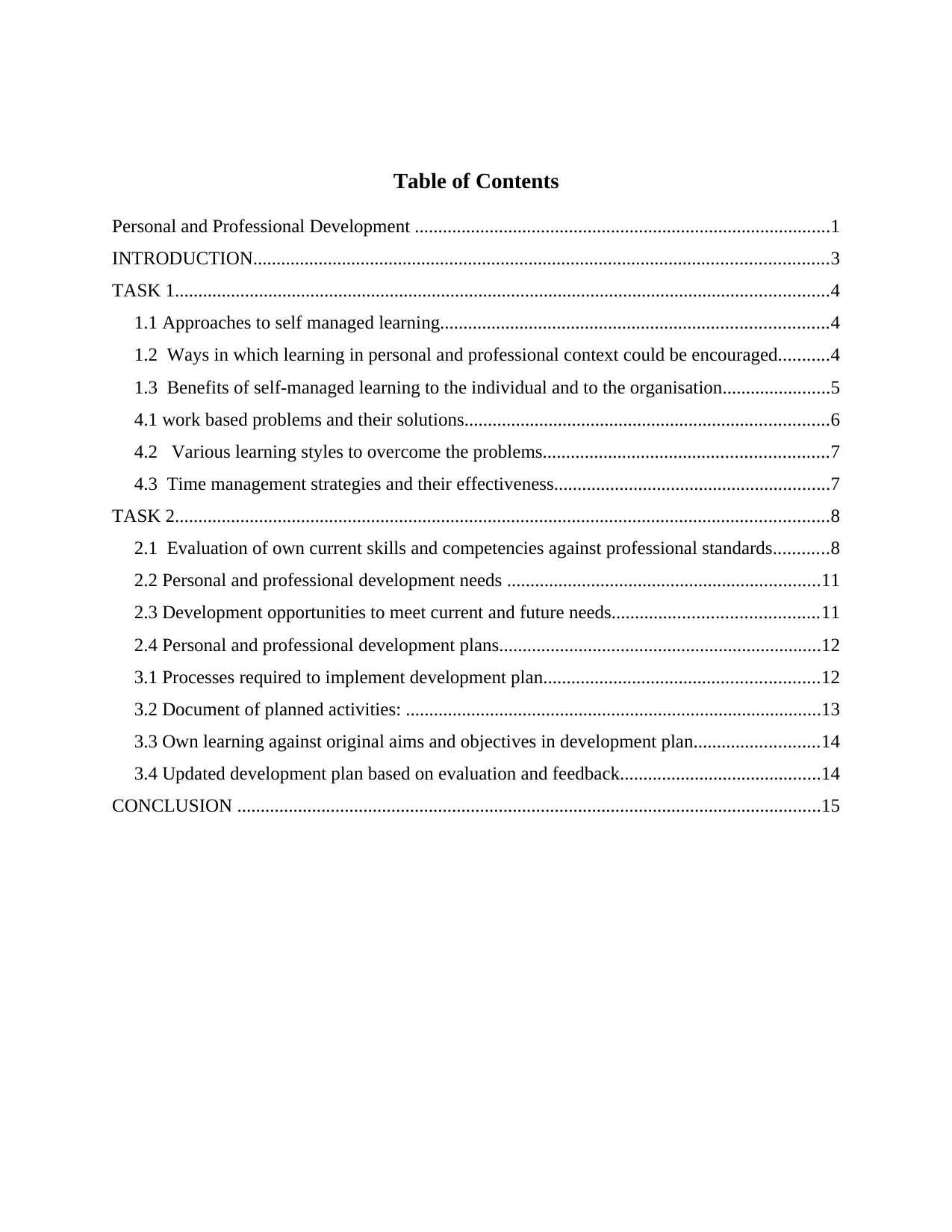
Table of Contents
Personal and Professional Development .........................................................................................1
INTRODUCTION...........................................................................................................................3
TASK 1............................................................................................................................................4
1.1 Approaches to self managed learning...................................................................................4
1.2 Ways in which learning in personal and professional context could be encouraged...........4
1.3 Benefits of self-managed learning to the individual and to the organisation.......................5
4.1 work based problems and their solutions..............................................................................6
4.2 Various learning styles to overcome the problems.............................................................7
4.3 Time management strategies and their effectiveness...........................................................7
TASK 2............................................................................................................................................8
2.1 Evaluation of own current skills and competencies against professional standards............8
2.2 Personal and professional development needs ...................................................................11
2.3 Development opportunities to meet current and future needs............................................11
2.4 Personal and professional development plans.....................................................................12
3.1 Processes required to implement development plan...........................................................12
3.2 Document of planned activities: .........................................................................................13
3.3 Own learning against original aims and objectives in development plan...........................14
3.4 Updated development plan based on evaluation and feedback...........................................14
CONCLUSION .............................................................................................................................15
Personal and Professional Development .........................................................................................1
INTRODUCTION...........................................................................................................................3
TASK 1............................................................................................................................................4
1.1 Approaches to self managed learning...................................................................................4
1.2 Ways in which learning in personal and professional context could be encouraged...........4
1.3 Benefits of self-managed learning to the individual and to the organisation.......................5
4.1 work based problems and their solutions..............................................................................6
4.2 Various learning styles to overcome the problems.............................................................7
4.3 Time management strategies and their effectiveness...........................................................7
TASK 2............................................................................................................................................8
2.1 Evaluation of own current skills and competencies against professional standards............8
2.2 Personal and professional development needs ...................................................................11
2.3 Development opportunities to meet current and future needs............................................11
2.4 Personal and professional development plans.....................................................................12
3.1 Processes required to implement development plan...........................................................12
3.2 Document of planned activities: .........................................................................................13
3.3 Own learning against original aims and objectives in development plan...........................14
3.4 Updated development plan based on evaluation and feedback...........................................14
CONCLUSION .............................................................................................................................15
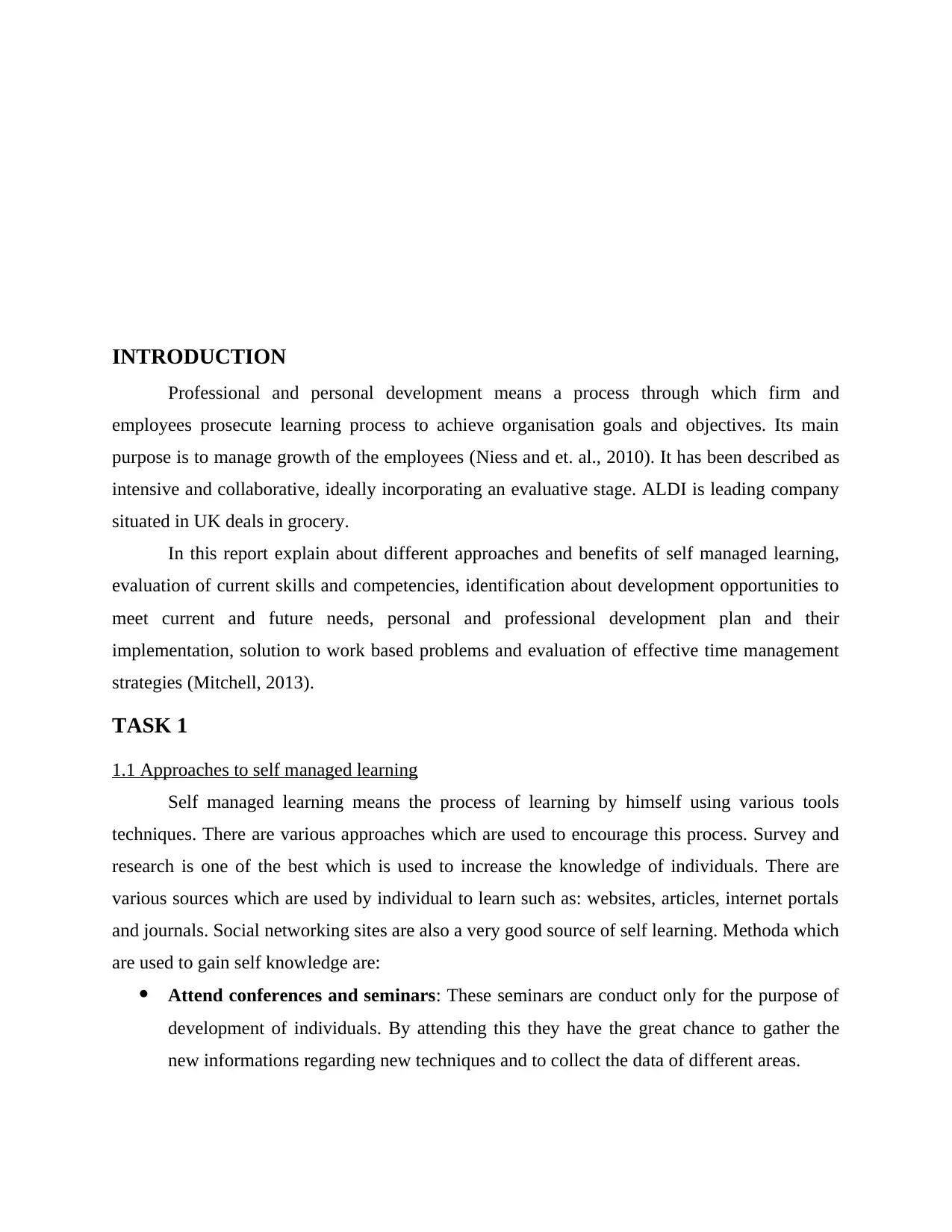
INTRODUCTION
Professional and personal development means a process through which firm and
employees prosecute learning process to achieve organisation goals and objectives. Its main
purpose is to manage growth of the employees (Niess and et. al., 2010). It has been described as
intensive and collaborative, ideally incorporating an evaluative stage. ALDI is leading company
situated in UK deals in grocery.
In this report explain about different approaches and benefits of self managed learning,
evaluation of current skills and competencies, identification about development opportunities to
meet current and future needs, personal and professional development plan and their
implementation, solution to work based problems and evaluation of effective time management
strategies (Mitchell, 2013).
TASK 1
1.1 Approaches to self managed learning
Self managed learning means the process of learning by himself using various tools
techniques. There are various approaches which are used to encourage this process. Survey and
research is one of the best which is used to increase the knowledge of individuals. There are
various sources which are used by individual to learn such as: websites, articles, internet portals
and journals. Social networking sites are also a very good source of self learning. Methoda which
are used to gain self knowledge are:
Attend conferences and seminars: These seminars are conduct only for the purpose of
development of individuals. By attending this they have the great chance to gather the
new informations regarding new techniques and to collect the data of different areas.
Professional and personal development means a process through which firm and
employees prosecute learning process to achieve organisation goals and objectives. Its main
purpose is to manage growth of the employees (Niess and et. al., 2010). It has been described as
intensive and collaborative, ideally incorporating an evaluative stage. ALDI is leading company
situated in UK deals in grocery.
In this report explain about different approaches and benefits of self managed learning,
evaluation of current skills and competencies, identification about development opportunities to
meet current and future needs, personal and professional development plan and their
implementation, solution to work based problems and evaluation of effective time management
strategies (Mitchell, 2013).
TASK 1
1.1 Approaches to self managed learning
Self managed learning means the process of learning by himself using various tools
techniques. There are various approaches which are used to encourage this process. Survey and
research is one of the best which is used to increase the knowledge of individuals. There are
various sources which are used by individual to learn such as: websites, articles, internet portals
and journals. Social networking sites are also a very good source of self learning. Methoda which
are used to gain self knowledge are:
Attend conferences and seminars: These seminars are conduct only for the purpose of
development of individuals. By attending this they have the great chance to gather the
new informations regarding new techniques and to collect the data of different areas.
⊘ This is a preview!⊘
Do you want full access?
Subscribe today to unlock all pages.

Trusted by 1+ million students worldwide
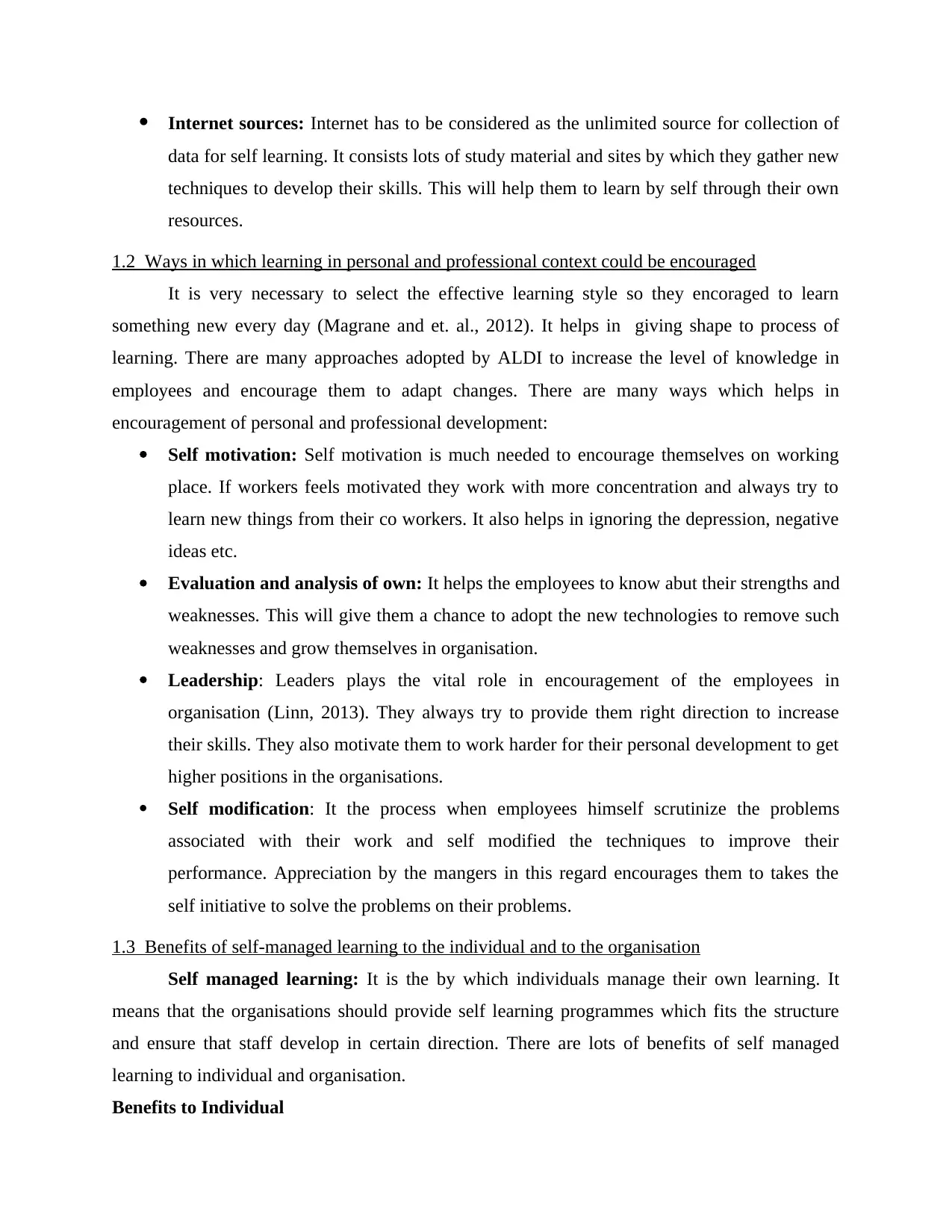
Internet sources: Internet has to be considered as the unlimited source for collection of
data for self learning. It consists lots of study material and sites by which they gather new
techniques to develop their skills. This will help them to learn by self through their own
resources.
1.2 Ways in which learning in personal and professional context could be encouraged
It is very necessary to select the effective learning style so they encoraged to learn
something new every day (Magrane and et. al., 2012). It helps in giving shape to process of
learning. There are many approaches adopted by ALDI to increase the level of knowledge in
employees and encourage them to adapt changes. There are many ways which helps in
encouragement of personal and professional development:
Self motivation: Self motivation is much needed to encourage themselves on working
place. If workers feels motivated they work with more concentration and always try to
learn new things from their co workers. It also helps in ignoring the depression, negative
ideas etc.
Evaluation and analysis of own: It helps the employees to know abut their strengths and
weaknesses. This will give them a chance to adopt the new technologies to remove such
weaknesses and grow themselves in organisation.
Leadership: Leaders plays the vital role in encouragement of the employees in
organisation (Linn, 2013). They always try to provide them right direction to increase
their skills. They also motivate them to work harder for their personal development to get
higher positions in the organisations.
Self modification: It the process when employees himself scrutinize the problems
associated with their work and self modified the techniques to improve their
performance. Appreciation by the mangers in this regard encourages them to takes the
self initiative to solve the problems on their problems.
1.3 Benefits of self-managed learning to the individual and to the organisation
Self managed learning: It is the by which individuals manage their own learning. It
means that the organisations should provide self learning programmes which fits the structure
and ensure that staff develop in certain direction. There are lots of benefits of self managed
learning to individual and organisation.
Benefits to Individual
data for self learning. It consists lots of study material and sites by which they gather new
techniques to develop their skills. This will help them to learn by self through their own
resources.
1.2 Ways in which learning in personal and professional context could be encouraged
It is very necessary to select the effective learning style so they encoraged to learn
something new every day (Magrane and et. al., 2012). It helps in giving shape to process of
learning. There are many approaches adopted by ALDI to increase the level of knowledge in
employees and encourage them to adapt changes. There are many ways which helps in
encouragement of personal and professional development:
Self motivation: Self motivation is much needed to encourage themselves on working
place. If workers feels motivated they work with more concentration and always try to
learn new things from their co workers. It also helps in ignoring the depression, negative
ideas etc.
Evaluation and analysis of own: It helps the employees to know abut their strengths and
weaknesses. This will give them a chance to adopt the new technologies to remove such
weaknesses and grow themselves in organisation.
Leadership: Leaders plays the vital role in encouragement of the employees in
organisation (Linn, 2013). They always try to provide them right direction to increase
their skills. They also motivate them to work harder for their personal development to get
higher positions in the organisations.
Self modification: It the process when employees himself scrutinize the problems
associated with their work and self modified the techniques to improve their
performance. Appreciation by the mangers in this regard encourages them to takes the
self initiative to solve the problems on their problems.
1.3 Benefits of self-managed learning to the individual and to the organisation
Self managed learning: It is the by which individuals manage their own learning. It
means that the organisations should provide self learning programmes which fits the structure
and ensure that staff develop in certain direction. There are lots of benefits of self managed
learning to individual and organisation.
Benefits to Individual
Paraphrase This Document
Need a fresh take? Get an instant paraphrase of this document with our AI Paraphraser
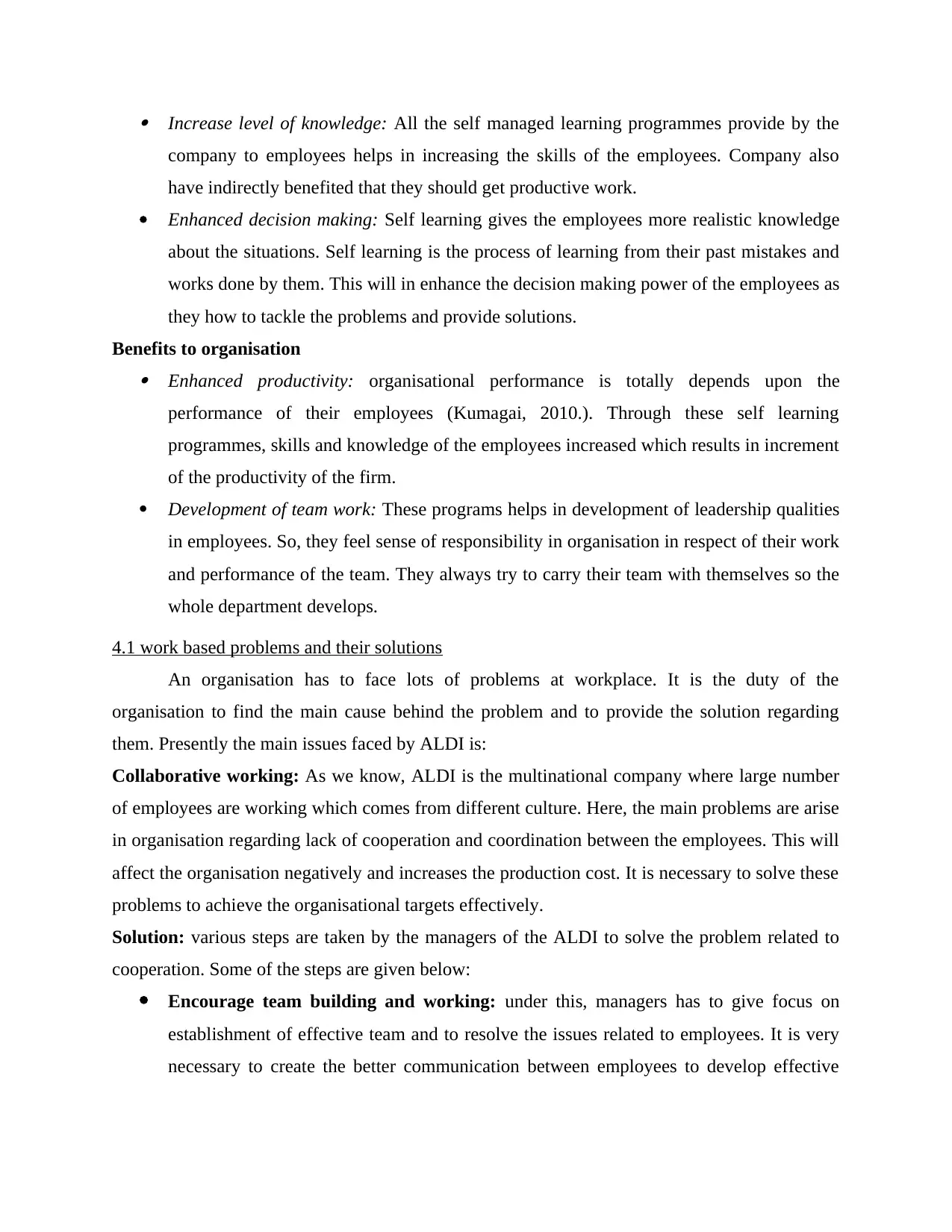
Increase level of knowledge: All the self managed learning programmes provide by the
company to employees helps in increasing the skills of the employees. Company also
have indirectly benefited that they should get productive work.
Enhanced decision making: Self learning gives the employees more realistic knowledge
about the situations. Self learning is the process of learning from their past mistakes and
works done by them. This will in enhance the decision making power of the employees as
they how to tackle the problems and provide solutions.
Benefits to organisation Enhanced productivity: organisational performance is totally depends upon the
performance of their employees (Kumagai, 2010.). Through these self learning
programmes, skills and knowledge of the employees increased which results in increment
of the productivity of the firm.
Development of team work: These programs helps in development of leadership qualities
in employees. So, they feel sense of responsibility in organisation in respect of their work
and performance of the team. They always try to carry their team with themselves so the
whole department develops.
4.1 work based problems and their solutions
An organisation has to face lots of problems at workplace. It is the duty of the
organisation to find the main cause behind the problem and to provide the solution regarding
them. Presently the main issues faced by ALDI is:
Collaborative working: As we know, ALDI is the multinational company where large number
of employees are working which comes from different culture. Here, the main problems are arise
in organisation regarding lack of cooperation and coordination between the employees. This will
affect the organisation negatively and increases the production cost. It is necessary to solve these
problems to achieve the organisational targets effectively.
Solution: various steps are taken by the managers of the ALDI to solve the problem related to
cooperation. Some of the steps are given below:
Encourage team building and working: under this, managers has to give focus on
establishment of effective team and to resolve the issues related to employees. It is very
necessary to create the better communication between employees to develop effective
company to employees helps in increasing the skills of the employees. Company also
have indirectly benefited that they should get productive work.
Enhanced decision making: Self learning gives the employees more realistic knowledge
about the situations. Self learning is the process of learning from their past mistakes and
works done by them. This will in enhance the decision making power of the employees as
they how to tackle the problems and provide solutions.
Benefits to organisation Enhanced productivity: organisational performance is totally depends upon the
performance of their employees (Kumagai, 2010.). Through these self learning
programmes, skills and knowledge of the employees increased which results in increment
of the productivity of the firm.
Development of team work: These programs helps in development of leadership qualities
in employees. So, they feel sense of responsibility in organisation in respect of their work
and performance of the team. They always try to carry their team with themselves so the
whole department develops.
4.1 work based problems and their solutions
An organisation has to face lots of problems at workplace. It is the duty of the
organisation to find the main cause behind the problem and to provide the solution regarding
them. Presently the main issues faced by ALDI is:
Collaborative working: As we know, ALDI is the multinational company where large number
of employees are working which comes from different culture. Here, the main problems are arise
in organisation regarding lack of cooperation and coordination between the employees. This will
affect the organisation negatively and increases the production cost. It is necessary to solve these
problems to achieve the organisational targets effectively.
Solution: various steps are taken by the managers of the ALDI to solve the problem related to
cooperation. Some of the steps are given below:
Encourage team building and working: under this, managers has to give focus on
establishment of effective team and to resolve the issues related to employees. It is very
necessary to create the better communication between employees to develop effective
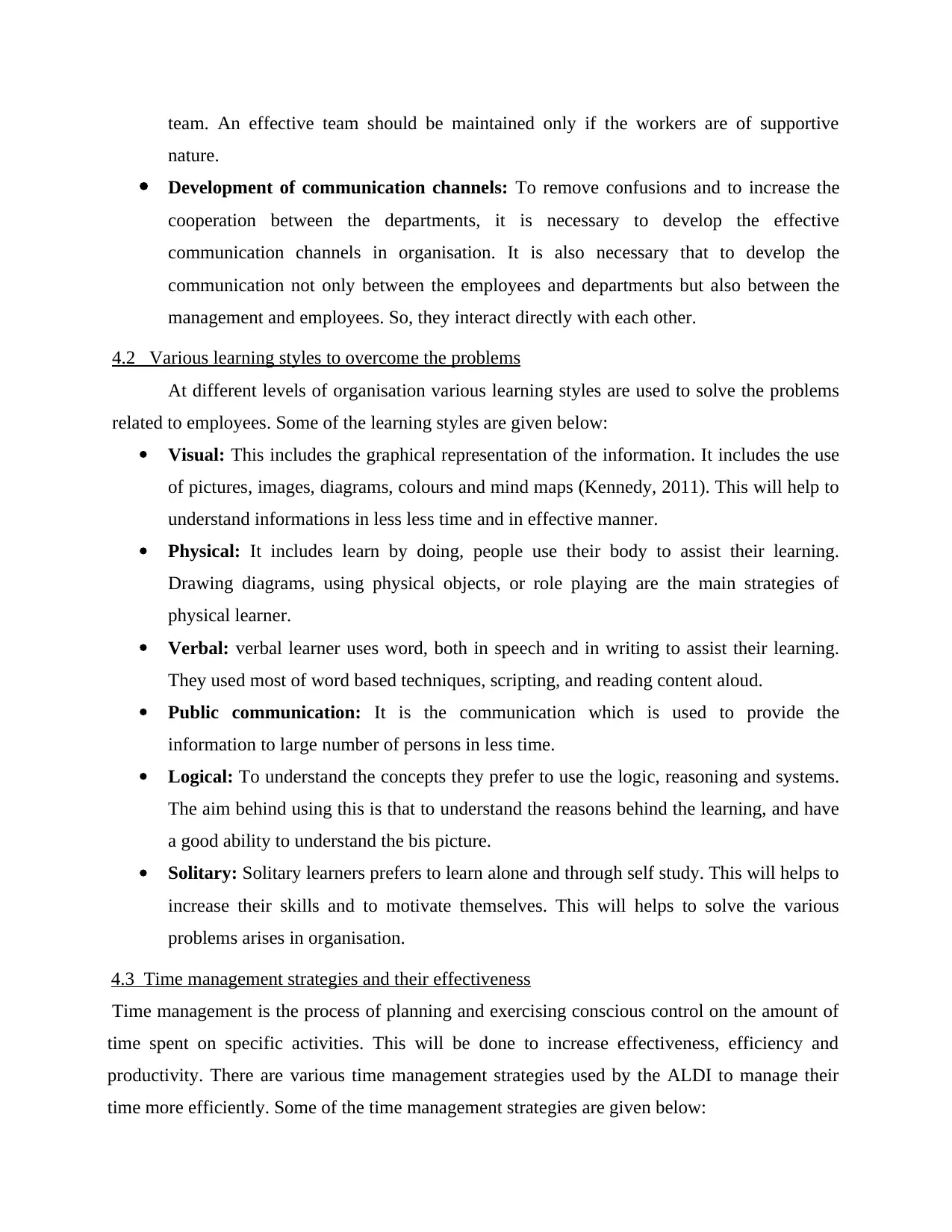
team. An effective team should be maintained only if the workers are of supportive
nature.
Development of communication channels: To remove confusions and to increase the
cooperation between the departments, it is necessary to develop the effective
communication channels in organisation. It is also necessary that to develop the
communication not only between the employees and departments but also between the
management and employees. So, they interact directly with each other.
4.2 Various learning styles to overcome the problems
At different levels of organisation various learning styles are used to solve the problems
related to employees. Some of the learning styles are given below:
Visual: This includes the graphical representation of the information. It includes the use
of pictures, images, diagrams, colours and mind maps (Kennedy, 2011). This will help to
understand informations in less less time and in effective manner.
Physical: It includes learn by doing, people use their body to assist their learning.
Drawing diagrams, using physical objects, or role playing are the main strategies of
physical learner.
Verbal: verbal learner uses word, both in speech and in writing to assist their learning.
They used most of word based techniques, scripting, and reading content aloud.
Public communication: It is the communication which is used to provide the
information to large number of persons in less time.
Logical: To understand the concepts they prefer to use the logic, reasoning and systems.
The aim behind using this is that to understand the reasons behind the learning, and have
a good ability to understand the bis picture.
Solitary: Solitary learners prefers to learn alone and through self study. This will helps to
increase their skills and to motivate themselves. This will helps to solve the various
problems arises in organisation.
4.3 Time management strategies and their effectiveness
Time management is the process of planning and exercising conscious control on the amount of
time spent on specific activities. This will be done to increase effectiveness, efficiency and
productivity. There are various time management strategies used by the ALDI to manage their
time more efficiently. Some of the time management strategies are given below:
nature.
Development of communication channels: To remove confusions and to increase the
cooperation between the departments, it is necessary to develop the effective
communication channels in organisation. It is also necessary that to develop the
communication not only between the employees and departments but also between the
management and employees. So, they interact directly with each other.
4.2 Various learning styles to overcome the problems
At different levels of organisation various learning styles are used to solve the problems
related to employees. Some of the learning styles are given below:
Visual: This includes the graphical representation of the information. It includes the use
of pictures, images, diagrams, colours and mind maps (Kennedy, 2011). This will help to
understand informations in less less time and in effective manner.
Physical: It includes learn by doing, people use their body to assist their learning.
Drawing diagrams, using physical objects, or role playing are the main strategies of
physical learner.
Verbal: verbal learner uses word, both in speech and in writing to assist their learning.
They used most of word based techniques, scripting, and reading content aloud.
Public communication: It is the communication which is used to provide the
information to large number of persons in less time.
Logical: To understand the concepts they prefer to use the logic, reasoning and systems.
The aim behind using this is that to understand the reasons behind the learning, and have
a good ability to understand the bis picture.
Solitary: Solitary learners prefers to learn alone and through self study. This will helps to
increase their skills and to motivate themselves. This will helps to solve the various
problems arises in organisation.
4.3 Time management strategies and their effectiveness
Time management is the process of planning and exercising conscious control on the amount of
time spent on specific activities. This will be done to increase effectiveness, efficiency and
productivity. There are various time management strategies used by the ALDI to manage their
time more efficiently. Some of the time management strategies are given below:
⊘ This is a preview!⊘
Do you want full access?
Subscribe today to unlock all pages.

Trusted by 1+ million students worldwide
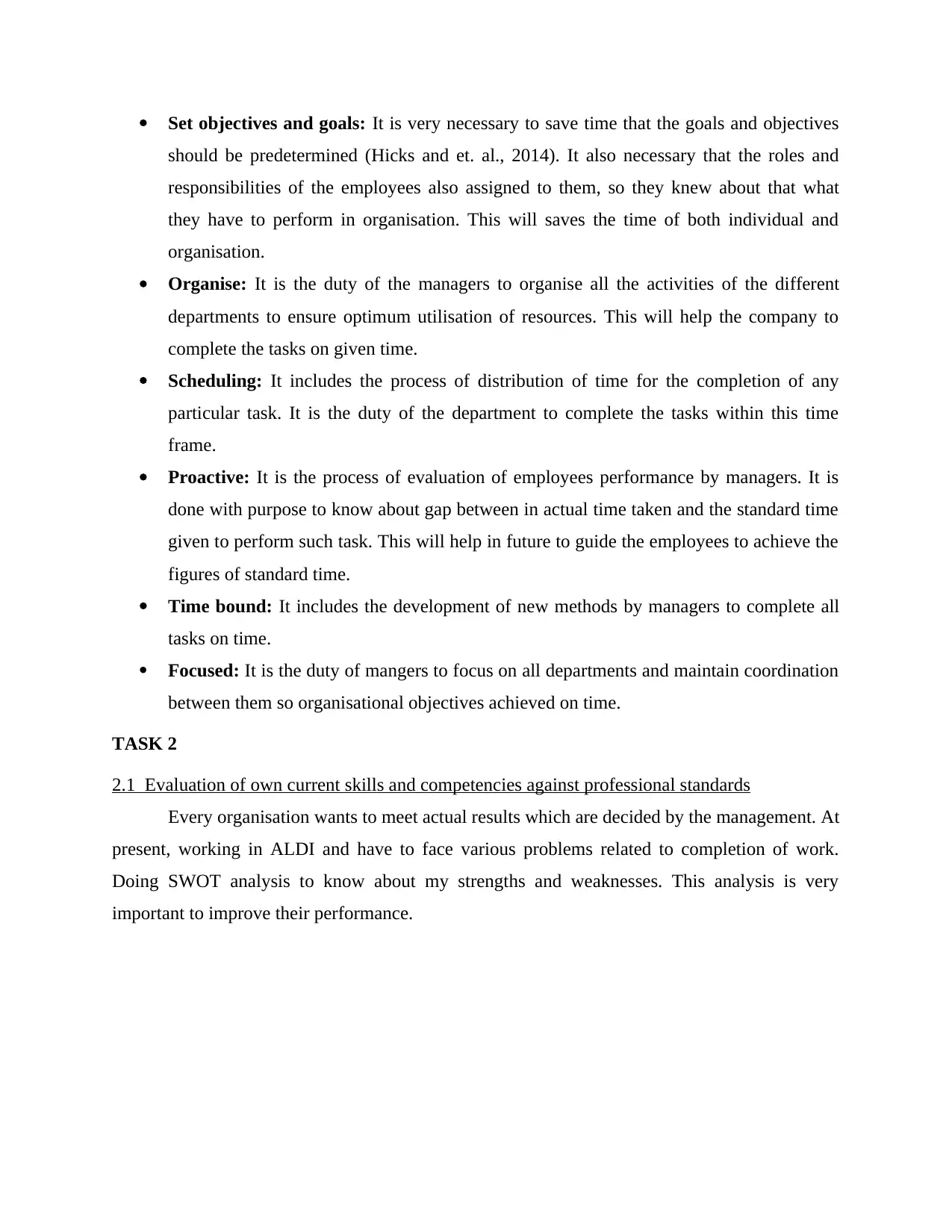
Set objectives and goals: It is very necessary to save time that the goals and objectives
should be predetermined (Hicks and et. al., 2014). It also necessary that the roles and
responsibilities of the employees also assigned to them, so they knew about that what
they have to perform in organisation. This will saves the time of both individual and
organisation.
Organise: It is the duty of the managers to organise all the activities of the different
departments to ensure optimum utilisation of resources. This will help the company to
complete the tasks on given time.
Scheduling: It includes the process of distribution of time for the completion of any
particular task. It is the duty of the department to complete the tasks within this time
frame.
Proactive: It is the process of evaluation of employees performance by managers. It is
done with purpose to know about gap between in actual time taken and the standard time
given to perform such task. This will help in future to guide the employees to achieve the
figures of standard time.
Time bound: It includes the development of new methods by managers to complete all
tasks on time.
Focused: It is the duty of mangers to focus on all departments and maintain coordination
between them so organisational objectives achieved on time.
TASK 2
2.1 Evaluation of own current skills and competencies against professional standards
Every organisation wants to meet actual results which are decided by the management. At
present, working in ALDI and have to face various problems related to completion of work.
Doing SWOT analysis to know about my strengths and weaknesses. This analysis is very
important to improve their performance.
should be predetermined (Hicks and et. al., 2014). It also necessary that the roles and
responsibilities of the employees also assigned to them, so they knew about that what
they have to perform in organisation. This will saves the time of both individual and
organisation.
Organise: It is the duty of the managers to organise all the activities of the different
departments to ensure optimum utilisation of resources. This will help the company to
complete the tasks on given time.
Scheduling: It includes the process of distribution of time for the completion of any
particular task. It is the duty of the department to complete the tasks within this time
frame.
Proactive: It is the process of evaluation of employees performance by managers. It is
done with purpose to know about gap between in actual time taken and the standard time
given to perform such task. This will help in future to guide the employees to achieve the
figures of standard time.
Time bound: It includes the development of new methods by managers to complete all
tasks on time.
Focused: It is the duty of mangers to focus on all departments and maintain coordination
between them so organisational objectives achieved on time.
TASK 2
2.1 Evaluation of own current skills and competencies against professional standards
Every organisation wants to meet actual results which are decided by the management. At
present, working in ALDI and have to face various problems related to completion of work.
Doing SWOT analysis to know about my strengths and weaknesses. This analysis is very
important to improve their performance.
Paraphrase This Document
Need a fresh take? Get an instant paraphrase of this document with our AI Paraphraser
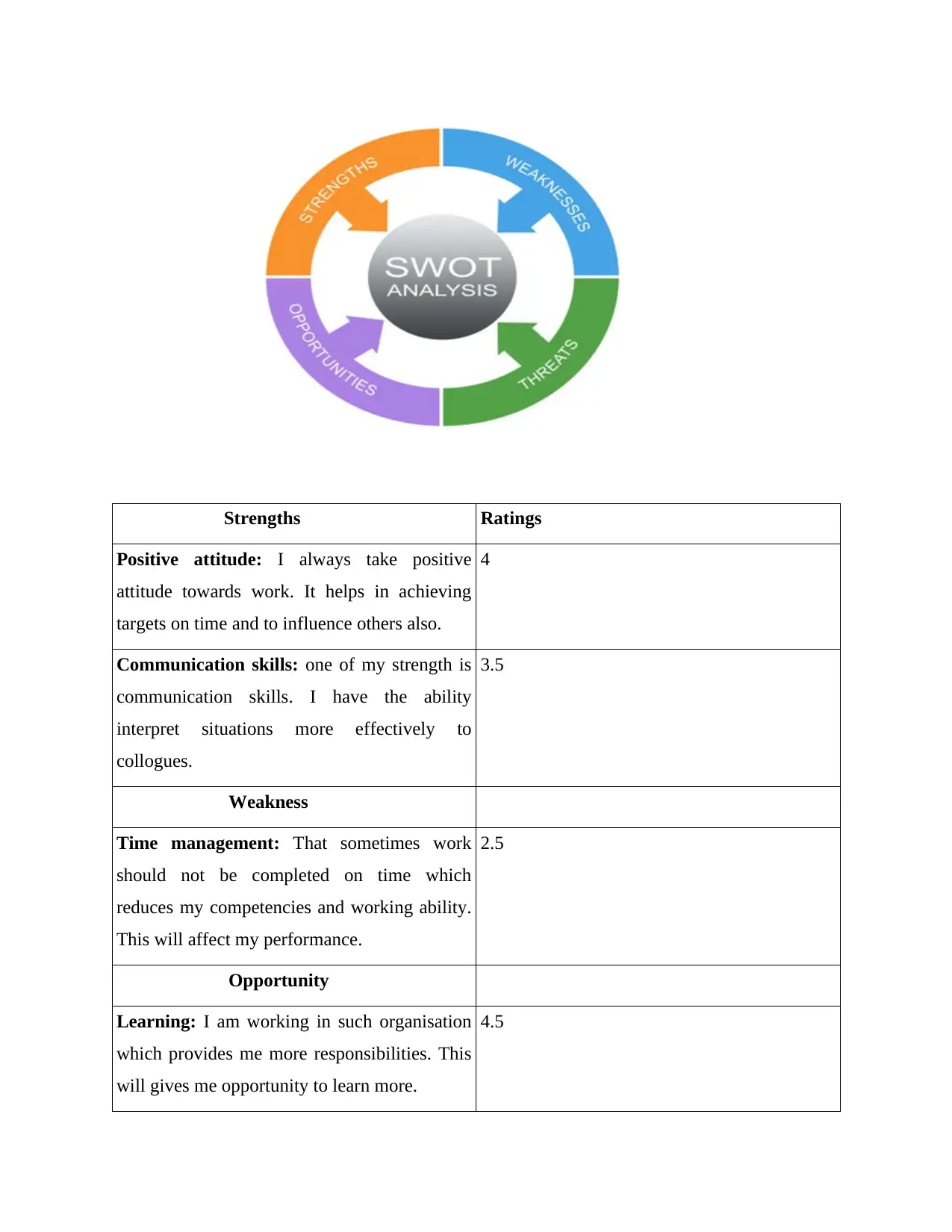
Strengths Ratings
Positive attitude: I always take positive
attitude towards work. It helps in achieving
targets on time and to influence others also.
4
Communication skills: one of my strength is
communication skills. I have the ability
interpret situations more effectively to
collogues.
3.5
Weakness
Time management: That sometimes work
should not be completed on time which
reduces my competencies and working ability.
This will affect my performance.
2.5
Opportunity
Learning: I am working in such organisation
which provides me more responsibilities. This
will gives me opportunity to learn more.
4.5
Positive attitude: I always take positive
attitude towards work. It helps in achieving
targets on time and to influence others also.
4
Communication skills: one of my strength is
communication skills. I have the ability
interpret situations more effectively to
collogues.
3.5
Weakness
Time management: That sometimes work
should not be completed on time which
reduces my competencies and working ability.
This will affect my performance.
2.5
Opportunity
Learning: I am working in such organisation
which provides me more responsibilities. This
will gives me opportunity to learn more.
4.5
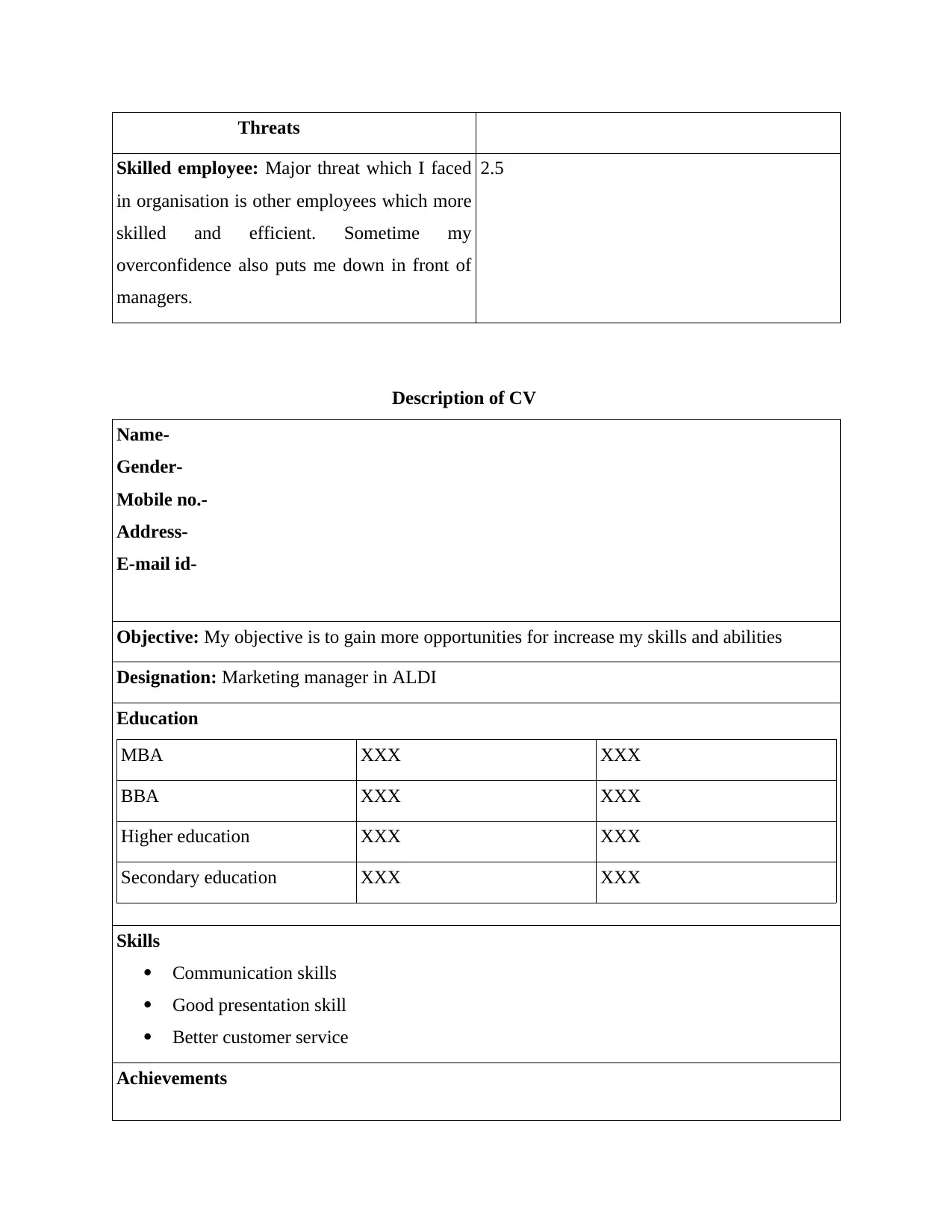
Threats
Skilled employee: Major threat which I faced
in organisation is other employees which more
skilled and efficient. Sometime my
overconfidence also puts me down in front of
managers.
2.5
Description of CV
Name-
Gender-
Mobile no.-
Address-
E-mail id-
Objective: My objective is to gain more opportunities for increase my skills and abilities
Designation: Marketing manager in ALDI
Education
MBA XXX XXX
BBA XXX XXX
Higher education XXX XXX
Secondary education XXX XXX
Skills
Communication skills
Good presentation skill
Better customer service
Achievements
Skilled employee: Major threat which I faced
in organisation is other employees which more
skilled and efficient. Sometime my
overconfidence also puts me down in front of
managers.
2.5
Description of CV
Name-
Gender-
Mobile no.-
Address-
E-mail id-
Objective: My objective is to gain more opportunities for increase my skills and abilities
Designation: Marketing manager in ALDI
Education
MBA XXX XXX
BBA XXX XXX
Higher education XXX XXX
Secondary education XXX XXX
Skills
Communication skills
Good presentation skill
Better customer service
Achievements
⊘ This is a preview!⊘
Do you want full access?
Subscribe today to unlock all pages.

Trusted by 1+ million students worldwide
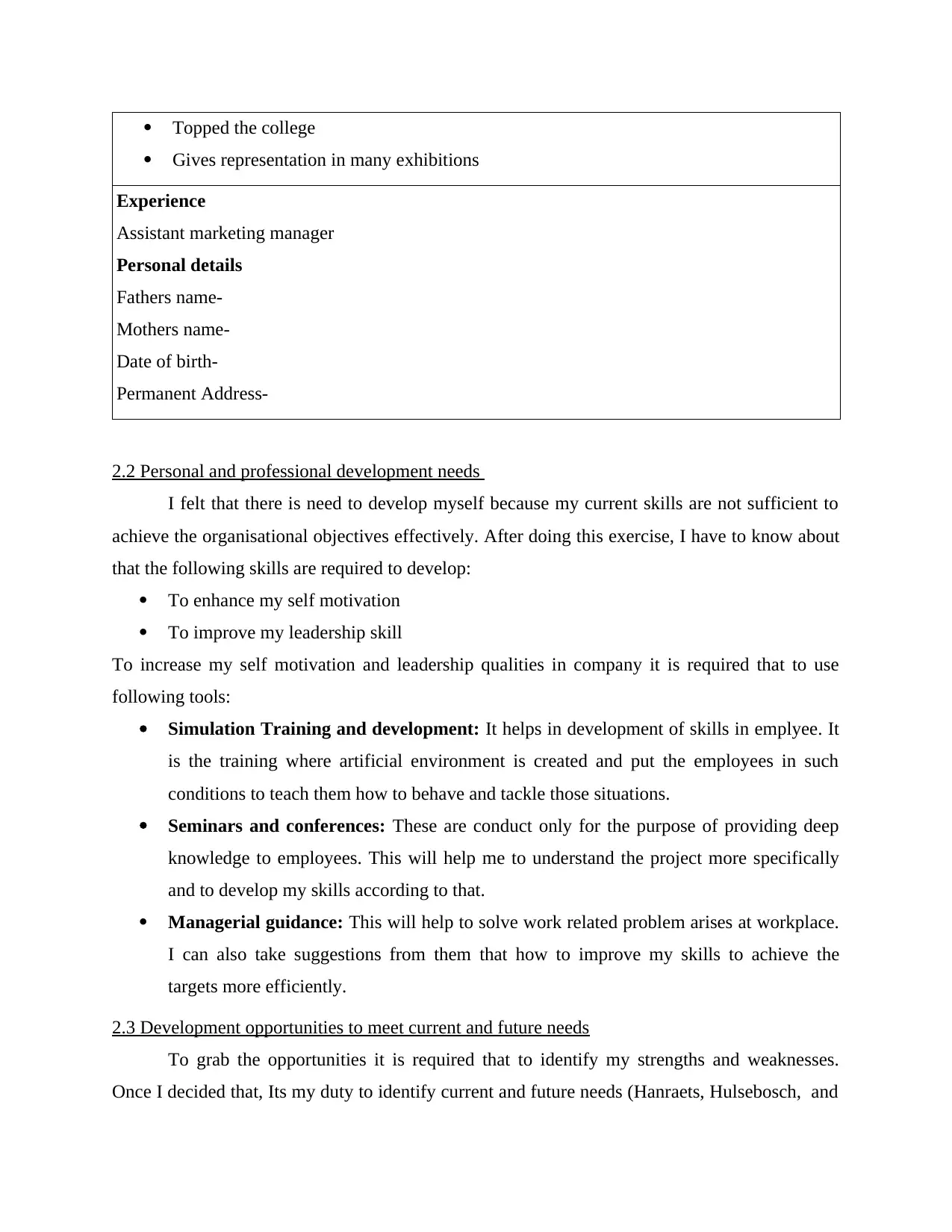
Topped the college
Gives representation in many exhibitions
Experience
Assistant marketing manager
Personal details
Fathers name-
Mothers name-
Date of birth-
Permanent Address-
2.2 Personal and professional development needs
I felt that there is need to develop myself because my current skills are not sufficient to
achieve the organisational objectives effectively. After doing this exercise, I have to know about
that the following skills are required to develop:
To enhance my self motivation
To improve my leadership skill
To increase my self motivation and leadership qualities in company it is required that to use
following tools:
Simulation Training and development: It helps in development of skills in emplyee. It
is the training where artificial environment is created and put the employees in such
conditions to teach them how to behave and tackle those situations.
Seminars and conferences: These are conduct only for the purpose of providing deep
knowledge to employees. This will help me to understand the project more specifically
and to develop my skills according to that.
Managerial guidance: This will help to solve work related problem arises at workplace.
I can also take suggestions from them that how to improve my skills to achieve the
targets more efficiently.
2.3 Development opportunities to meet current and future needs
To grab the opportunities it is required that to identify my strengths and weaknesses.
Once I decided that, Its my duty to identify current and future needs (Hanraets, Hulsebosch, and
Gives representation in many exhibitions
Experience
Assistant marketing manager
Personal details
Fathers name-
Mothers name-
Date of birth-
Permanent Address-
2.2 Personal and professional development needs
I felt that there is need to develop myself because my current skills are not sufficient to
achieve the organisational objectives effectively. After doing this exercise, I have to know about
that the following skills are required to develop:
To enhance my self motivation
To improve my leadership skill
To increase my self motivation and leadership qualities in company it is required that to use
following tools:
Simulation Training and development: It helps in development of skills in emplyee. It
is the training where artificial environment is created and put the employees in such
conditions to teach them how to behave and tackle those situations.
Seminars and conferences: These are conduct only for the purpose of providing deep
knowledge to employees. This will help me to understand the project more specifically
and to develop my skills according to that.
Managerial guidance: This will help to solve work related problem arises at workplace.
I can also take suggestions from them that how to improve my skills to achieve the
targets more efficiently.
2.3 Development opportunities to meet current and future needs
To grab the opportunities it is required that to identify my strengths and weaknesses.
Once I decided that, Its my duty to identify current and future needs (Hanraets, Hulsebosch, and
Paraphrase This Document
Need a fresh take? Get an instant paraphrase of this document with our AI Paraphraser
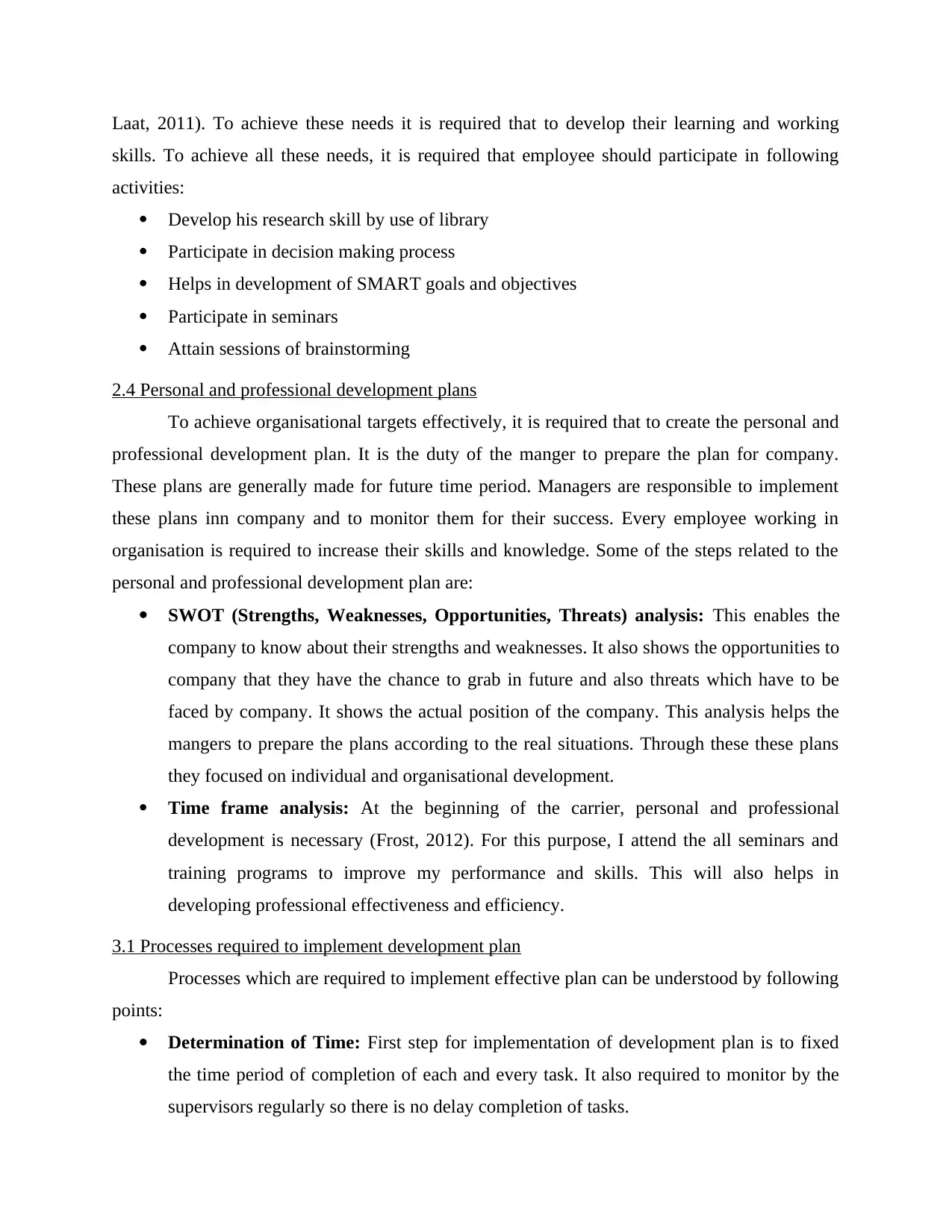
Laat, 2011). To achieve these needs it is required that to develop their learning and working
skills. To achieve all these needs, it is required that employee should participate in following
activities:
Develop his research skill by use of library
Participate in decision making process
Helps in development of SMART goals and objectives
Participate in seminars
Attain sessions of brainstorming
2.4 Personal and professional development plans
To achieve organisational targets effectively, it is required that to create the personal and
professional development plan. It is the duty of the manger to prepare the plan for company.
These plans are generally made for future time period. Managers are responsible to implement
these plans inn company and to monitor them for their success. Every employee working in
organisation is required to increase their skills and knowledge. Some of the steps related to the
personal and professional development plan are:
SWOT (Strengths, Weaknesses, Opportunities, Threats) analysis: This enables the
company to know about their strengths and weaknesses. It also shows the opportunities to
company that they have the chance to grab in future and also threats which have to be
faced by company. It shows the actual position of the company. This analysis helps the
mangers to prepare the plans according to the real situations. Through these these plans
they focused on individual and organisational development.
Time frame analysis: At the beginning of the carrier, personal and professional
development is necessary (Frost, 2012). For this purpose, I attend the all seminars and
training programs to improve my performance and skills. This will also helps in
developing professional effectiveness and efficiency.
3.1 Processes required to implement development plan
Processes which are required to implement effective plan can be understood by following
points:
Determination of Time: First step for implementation of development plan is to fixed
the time period of completion of each and every task. It also required to monitor by the
supervisors regularly so there is no delay completion of tasks.
skills. To achieve all these needs, it is required that employee should participate in following
activities:
Develop his research skill by use of library
Participate in decision making process
Helps in development of SMART goals and objectives
Participate in seminars
Attain sessions of brainstorming
2.4 Personal and professional development plans
To achieve organisational targets effectively, it is required that to create the personal and
professional development plan. It is the duty of the manger to prepare the plan for company.
These plans are generally made for future time period. Managers are responsible to implement
these plans inn company and to monitor them for their success. Every employee working in
organisation is required to increase their skills and knowledge. Some of the steps related to the
personal and professional development plan are:
SWOT (Strengths, Weaknesses, Opportunities, Threats) analysis: This enables the
company to know about their strengths and weaknesses. It also shows the opportunities to
company that they have the chance to grab in future and also threats which have to be
faced by company. It shows the actual position of the company. This analysis helps the
mangers to prepare the plans according to the real situations. Through these these plans
they focused on individual and organisational development.
Time frame analysis: At the beginning of the carrier, personal and professional
development is necessary (Frost, 2012). For this purpose, I attend the all seminars and
training programs to improve my performance and skills. This will also helps in
developing professional effectiveness and efficiency.
3.1 Processes required to implement development plan
Processes which are required to implement effective plan can be understood by following
points:
Determination of Time: First step for implementation of development plan is to fixed
the time period of completion of each and every task. It also required to monitor by the
supervisors regularly so there is no delay completion of tasks.
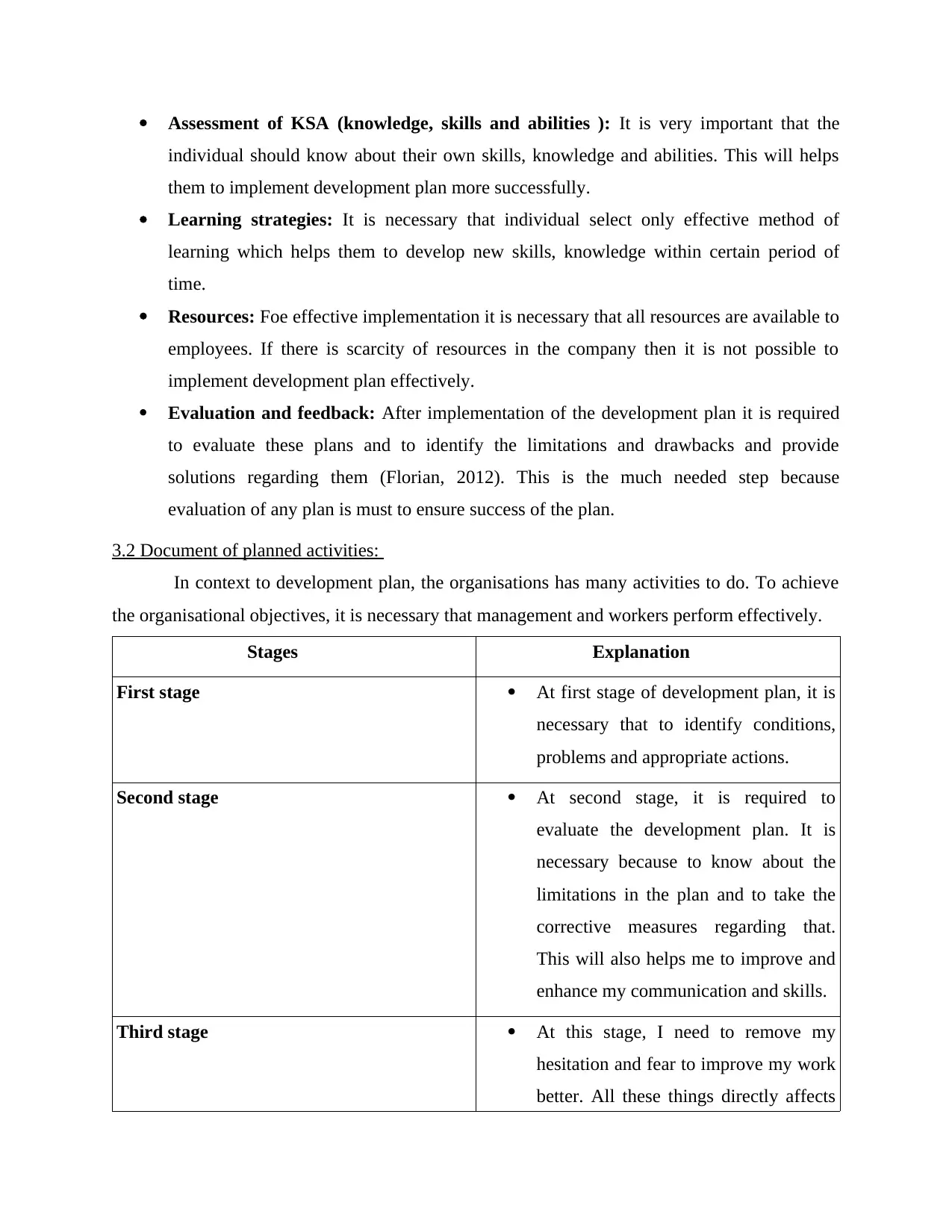
Assessment of KSA (knowledge, skills and abilities ): It is very important that the
individual should know about their own skills, knowledge and abilities. This will helps
them to implement development plan more successfully.
Learning strategies: It is necessary that individual select only effective method of
learning which helps them to develop new skills, knowledge within certain period of
time.
Resources: Foe effective implementation it is necessary that all resources are available to
employees. If there is scarcity of resources in the company then it is not possible to
implement development plan effectively.
Evaluation and feedback: After implementation of the development plan it is required
to evaluate these plans and to identify the limitations and drawbacks and provide
solutions regarding them (Florian, 2012). This is the much needed step because
evaluation of any plan is must to ensure success of the plan.
3.2 Document of planned activities:
In context to development plan, the organisations has many activities to do. To achieve
the organisational objectives, it is necessary that management and workers perform effectively.
Stages Explanation
First stage At first stage of development plan, it is
necessary that to identify conditions,
problems and appropriate actions.
Second stage At second stage, it is required to
evaluate the development plan. It is
necessary because to know about the
limitations in the plan and to take the
corrective measures regarding that.
This will also helps me to improve and
enhance my communication and skills.
Third stage At this stage, I need to remove my
hesitation and fear to improve my work
better. All these things directly affects
individual should know about their own skills, knowledge and abilities. This will helps
them to implement development plan more successfully.
Learning strategies: It is necessary that individual select only effective method of
learning which helps them to develop new skills, knowledge within certain period of
time.
Resources: Foe effective implementation it is necessary that all resources are available to
employees. If there is scarcity of resources in the company then it is not possible to
implement development plan effectively.
Evaluation and feedback: After implementation of the development plan it is required
to evaluate these plans and to identify the limitations and drawbacks and provide
solutions regarding them (Florian, 2012). This is the much needed step because
evaluation of any plan is must to ensure success of the plan.
3.2 Document of planned activities:
In context to development plan, the organisations has many activities to do. To achieve
the organisational objectives, it is necessary that management and workers perform effectively.
Stages Explanation
First stage At first stage of development plan, it is
necessary that to identify conditions,
problems and appropriate actions.
Second stage At second stage, it is required to
evaluate the development plan. It is
necessary because to know about the
limitations in the plan and to take the
corrective measures regarding that.
This will also helps me to improve and
enhance my communication and skills.
Third stage At this stage, I need to remove my
hesitation and fear to improve my work
better. All these things directly affects
⊘ This is a preview!⊘
Do you want full access?
Subscribe today to unlock all pages.

Trusted by 1+ million students worldwide
1 out of 16
Related Documents
Your All-in-One AI-Powered Toolkit for Academic Success.
+13062052269
info@desklib.com
Available 24*7 on WhatsApp / Email
![[object Object]](/_next/static/media/star-bottom.7253800d.svg)
Unlock your academic potential
Copyright © 2020–2026 A2Z Services. All Rights Reserved. Developed and managed by ZUCOL.





